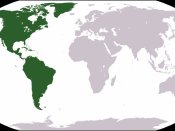The book that I made a review of is IMAGINED COMMUNITIES, Reflections on the Origin and Spread of Nationalism, by Benedict Anderson. It was first published in 1983, by Verso. This is a revised and extended edition, (2nd rev. ed), including 206 pages and 17 pages of Bibliography and Index, published in 1991, by Verso again, in London.
Benedict Anderson is Aaron L. Binenkorb Professor of International Studies at Cornell University since 1988, and he's been in teaching position at school of Government at Cornell since 1965. Anderson has a high reputation concerning nationalism studies, and his specialty is on Southeast Asia. Up to now he own 237 publications, including various articles and books such as Java in a Time of Revolution, Literature and Politics in Siam in the American Era and Language and Power: Exploring Political Cultures in Indonesia. The sources he benefits from and the data he uses indicate a rich and intense literature review, which has a concentration on Southeast Asia, namely Javanese culture.
It is a book on nationalism and history. Anderson's work is short, beautifully written, and very wide in scope.
There are two major themes in the book, which I find noteworthy to mention; first one suggests that "ÃÂNationalism is universal"ÃÂeveryone has one, but they are all unique.' Following this, the second theme is "ÃÂNationalism is politically very powerful, but philosophically quite bankrupt"ÃÂwe all cling to it, but no one knows exactly what it means.' The author makes a definition of imagined communities, "The nation is an imagined political community, imagined both inherently limited and sovereign"ÃÂ(6). Anderson uses the term Imagined Community in order to formulate an alternative interpretation of nationalism. It is imagined because we will never know our fellow members. The creation and development of imagined communities are examined throughout...


